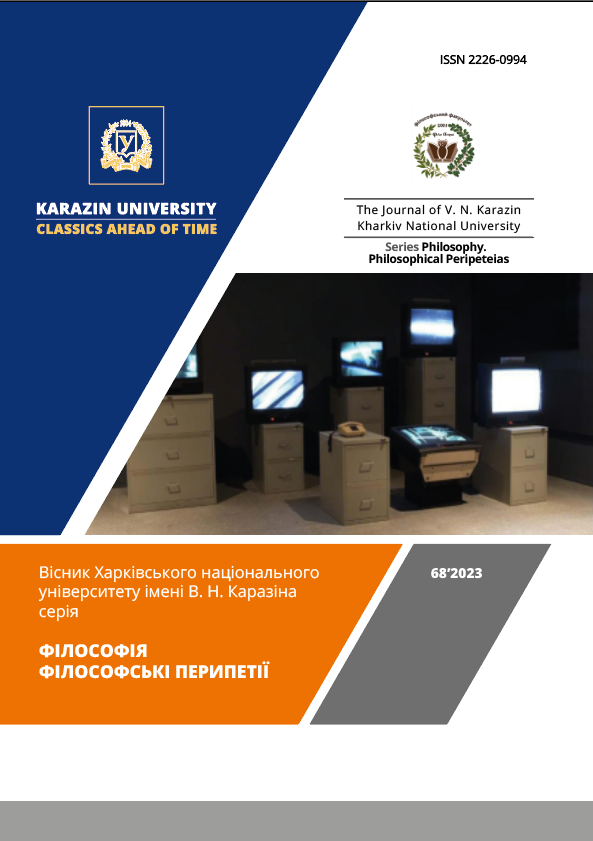THE TRANSHUMANIS’M PERSPECTIVE: CONCEPTS OF THE POSTHUMAN
Abstract
Introduction. Posthuman concepts raise many ethical, philosophical and social questions. Such as fair access to such technologies, preservation of our humanity, interaction of new forms of posthuman society and culture, and others. These questions require investigation and critical reflection if we are to influence our posthuman future. The aim of the article is an analysis of transhumanism as a metacultural attitude that affects modern humanity and shapes its future prospects. Special attention is focused on ideas and concepts of transhumanism influence the formation of the concept of the posthuman, and how this process can change our understanding of human existence. We aim to indicate the essence of the concept of the posthuman in the context of transhumanism and the technological and socio-cultural changes necessary for its emergence and the consequences and ethical challenges along the way. Research methodology is a complex of philosophical and general scientific methods. The article also uses sociocultural, systemic and synergistic approaches. Research results. Philosophers in their research emphasize the need to develop careful cultural and political strategies to control the development of the posthuman and minimize potential negative risks. First, technological progress itself must be regulated, because any interference in human nature must not lead to negative consequences. Secondly, it is important that society is informed about how technological progress can affect the future. Thirdly, it is important to invest in scientific research in order to gradually introduce technological advances into our lives and start a deliberate path to the posthuman now. Conclusions. The posthuman is a possible future for humanity. And the evolution of man to post-man began yesterday. It is important that we actively manage this process, using regulation, ethical standards, scientific research and social dialogue to ensure that a posthuman future is in our collective interest and a common human value
Downloads
References
Bostrom, N. (2003). The Transhumanist FAQ. A General Introduction. Oxford: World Transhumanist Association.
Bostrom, N. (2003). Transhumanist Values. Ethical Issues for the 21st Century / ed. Frederick Adams. Philosophical Documentation. Center Press. URL: https://nickbostrom.com/ethics/values.
Bostrom, N. (2020). Superintelligence. Strategies and dangers of the development of intelligent machines. Kyiv: Nash format.
Fukuyama, F. (2002). Our Posthuman Future: Consequences of the Biotechnology Revolution. New York: Farrar, Straus & Giroux.
Gumilang L., Retnaningdyah P. (2022). Being Posthuman Through Biopolitics in Neal Shusterman’s Unwind. TELL: Teaching of English Language and Literature Journal, 10, 1, April. https://doi.org/10.30651/tell.v10i1.8932
Gray, C. H. (2001). Cyborg Citizen Politics in the Posthuman Age. London: Routledge.
Kurzweil, R. (2005). The Singularity is Near: When Humans Transcended Biology. New York: Viking.
Pylypenko, S. G. (2020). Human in the era of technological shifts: in search of support / Svitlana Hryhorivna Pylypenko. // The Journal of V.N.Karazin Kharkiv National University. Series: Theory of Culture and Philosophy of Science, 61. 81–89. https://doi.org/10.26565/2306-6687-2020-61-09
The Ethics of Human Enhancement: Understanding the Debate (2016). / Ed. St. Clarke, J. Savulescu, C.A.J. Coady, A. Giubilini, S. Sanyal. Oxford: Oxford University Press.
Copyright (c) 2023 Тетяна Кісельова

This work is licensed under a Creative Commons Attribution 4.0 International License.
Authors who publish with this journal agree to the following terms:
- Authors retain copyright and grant the journal right of first publication of this work under the terms of a license Creative Commons Attribution License 4.0 International (CC BY 4.0).
- Authors are able to enter into separate, additional contractual arrangements for the non-exclusive distribution of the journal's published version of the work (e.g., post it to an institutional repository or publish it in a book), with an acknowledgement of its initial publication in this journal.
- Authors are permitted and encouraged to post their work online (e.g., in institutional repositories or on their website) prior to and during the submission process, as it can lead to productive exchanges, as well as earlier and greater citation of published work.






3.gif)




